#fantasy world stuff
Text
another thing fantasy writers should keep track of is how much of their worldbuilding is aesthetic-based. it's not unlike the sci-fi hardness scale, which measures how closely a story holds to known, real principles of science. The Martian is extremely hard sci-fi, with nearly every detail being grounded in realistic fact as we know it; Star Trek is extremely soft sci-fi, with a vaguely plausible "space travel and no resource scarcity" premise used as a foundation for the wildest ideas the writers' room could come up with. and much as Star Trek fuckin rules, there's nothing wrong with aesthetic-based fantasy worldbuilding!
(sidenote we're not calling this 'soft fantasy' bc there's already a hard/soft divide in fantasy: hard magic follows consistent rules, like "earthbenders can always and only bend earth", and soft magic follows vague rules that often just ~feel right~, like the Force. this frankly kinda maps, but I'm not talking about just the magic, I'm talking about the worldbuilding as a whole.
actually for the purposes of this post we're calling it grounded vs airy fantasy, bc that's succinct and sounds cool.)
a great example of grounded fantasy is Dungeon Meshi: the dungeon ecosystem is meticulously thought out, the plot is driven by the very realistic need to eat well while adventuring, the story touches on both social and psychological effects of the whole 'no one dies forever down here' situation, the list goes on. the worldbuilding wants to be engaged with on a mechanical level and it rewards that engagement.
deliberately airy fantasy is less common, because in a funny way it's much harder to do. people tend to like explanations. it takes skill to pull off "the world is this way because I said so." Narnia manages: these kids fall into a magic world through the back of a wardrobe, befriend talking beavers who drink tea, get weapons from Santa Claus, dance with Bacchus and his maenads, and sail to the edge of the world, without ever breaking suspension of disbelief. it works because every new thing that happens fits the vibes. it's all just vibes! engaging with the worldbuilding on a mechanical level wouldn't just be futile, it'd be missing the point entirely.
the reason I started off calling this aesthetic-based is that an airy story will usually lean hard on an existing aesthetic, ideally one that's widely known by the target audience. Lewis was drawing on fables, fairy tales, myths, children's stories, and the vague idea of ~medieval europe~ that is to this day our most generic fantasy setting. when a prince falls in love with a fallen star, when there are giants who welcome lost children warmly and fatten them up for the feast, it all fits because these are things we'd expect to find in this story. none of this jars against what we've already seen.
and the point of it is to be wondrous and whimsical, to set the tone for the story Lewis wants to tell. and it does a great job! the airy worldbuilding serves the purposes of the story, and it's no less elegant than Ryōko Kui's elaborately grounded dungeon. neither kind of worldbuilding is better than the other.
however.
you do have to know which one you're doing.
the whole reason I'm writing this is that I saw yet another long, entertaining post dragging GRRM for absolute filth. asoiaf is a fun one because on some axes it's pretty grounded (political fuck-around-and-find-out, rumors spread farther than fact, fastest way to lose a war is to let your people starve, etc), but on others it's entirely airy (some people have magic Just Cause, the various peoples are each based on an aesthetic/stereotype/cliché with no real thought to how they influence each other as neighbors, the super-long seasons have no effect on ecology, etc).
and again! none of this is actually bad! (well ok some of those stereotypes are quite bigoted. but other than that this isn't bad.) there's nothing wrong with the season thing being there to highlight how the nobles are focused on short-sighted wars for power instead of storing up resources for the extremely dangerous and inevitable winter, that's a nice allegory, and the looming threat of many harsh years set the narrative tone. and you can always mix and match airy and grounded worldbuilding – everyone does it, frankly it's a necessity, because sooner or later the answer to every worldbuilding question is "because the author wanted it to be that way." the only completely grounded writing is nonfiction.
the problem is when you pretend that your entirely airy worldbuilding is actually super duper grounded. like, for instance, claiming that your vibes-based depiction of Medieval Europe (Gritty Edition) is completely historical, and then never even showing anyone spinning. or sniffing dismissively at Tolkien for not detailing Aragorn's tax policy, and then never addressing how a pre-industrial grain-based agricultural society is going years without harvesting any crops. (stored grain goes bad! you can't even mouse-proof your silos, how are you going to deal with mold?) and the list goes on.
the man went up on national television and invited us to engage with his worldbuilding mechanically, and then if you actually do that, it shatters like spun sugar under the pressure. doesn't he realize that's not the part of the story that's load-bearing! he should've directed our focus to the political machinations and extensive trope deconstruction, not the handwavey bit.
point is, as a fantasy writer there will always be some amount of your worldbuilding that boils down to 'because I said so,' and there's nothing wrong with that. nor is there anything wrong with making that your whole thing – airy worldbuilding can be beautiful and inspiring. but you have to be aware of what you're doing, because if you ask your readers to engage with the worldbuilding in gritty mechanical detail, you had better have some actual mechanics to show them.
#finx rambles#worldbuilding#for writers#honestly I quite liked the asoiaf books I read#it's a well-constructed story! it's a well-constructed world too on its own merits#none of this stuff about grain and spinning is actually important to the story#the problem is that grrm himself seems to just. not realize this#and goes about blithely insisting he's created an extraordinarily realistic fantasy world where all the tax policies make sense#he has not!#he has invited people to tear his creation apart if they can and! it turns out! they absolutely can!#this shit's got no tensile strength! it's made of glue and popsicle sticks!#you're not supposed to put weight on it
4K notes
·
View notes
Text
How Do I Make My Fictional Gypsies Not Racist?
(Or, "You can't, sorry, but…")
You want to include some Gypsies in your fantasy setting. Or, you need someone for your main characters to meet, who is an outsider in the eyes of the locals, but who already lives here. Or you need a culture in conflict with your settled people, or who have just arrived out of nowhere. Or, you just like the idea of campfires in the forest and voices raised in song. And you’re about to step straight into a muckpile of cliches and, accidentally, write something racist.
(In this, I am mostly using Gypsy as an endonym of Romany people, who are a subset of the Romani people, alongside Roma, Sinti, Gitano, Romanisael, Kale, etc, but also in the theory of "Gypsying" as proposed by Lex and Percy H, where Romani people are treated with a particular mix of orientalism, criminalisation, racialisation, and othering, that creates "The Gypsy" out of both nomadic peoples as a whole and people with Romani heritage and racialised physical features, languages, and cultural markers)
Enough of my friends play TTRPGs or write fantasy stories that this question comes up a lot - They mention Dungeons and Dragons’ Curse Of Strahd, World Of Darkness’s Gypsies, World Of Darkness’s Ravnos, World of Darkness’s Silent Striders… And they roll their eyes and say “These are all terrible! But how can I do it, you know, without it being racist?”
And their eyes are big and sad and ever so hopeful that I will tell them the secret of how to take the Roma of the real world and place them in a fictional one, whilst both appealing to gorjer stereotypes of Gypsies and not adding to the weight of stereotyping that already crushes us. So, disappointingly, there is no secret.
Gypsies, like every other real-world culture, exist as we do today because of interactions with cultures and geography around us: The living waggon, probably the archetypal thing which gorjer writers want to include in their portrayals of nomads, is a relatively modern invention - Most likely French, and adopted from French Showmen by Romanies, who brought it to Britain. So already, that’s a tradition that only spans a small amount of the time that Gypsies have existed, and only a small number of the full breadth of Romani ways of living. But the reasons that the waggon is what it is are based on the real world - The wheels are tall and iron-rimmed, because although you expect to travel on cobbled, tarmac, or packed-earth roads and for comparatively short distances, it wasn’t rare to have to ford a river in Britain in the late nineteenth century, on country roads. They were drawn by a single horse, and the shape of that horse was determined by a mixture of local breeds - Welsh cobs, fell ponies, various draft breeds - as well as by the aesthetic tastes of the breeders. The stove inside is on the left, so that as you move down a British road, the chimney sticks up into the part where there will be the least overhanging branches, to reduce the chance of hitting it.
So taking a fictional setting that looks like (for example) thirteenth century China (with dragons), and placing a nineteenth century Romanichal family in it will inevitably result in some racist assumptions being made, as the answer to “Why does this culture do this?” becomes “They just do it because I want them to” rather than having a consistent internal logic.
Some stereotypes will always follow nomads - They appear in different forms in different cultures, but they always arise from the settled people's same fears: That the nomads don't share their values, and are fundamentally strangers. Common ones are that we have a secret language to fool outsiders with, that we steal children and disguise them as our own, that our sexual morals are shocking (This one has flipped in the last half century - From the Gypsy Lore Society's talk of the lascivious Romni seductress who will lie with a strange man for a night after a 'gypsy wedding', to today's frenzied talk of 'grabbing' and sexually-conservative early marriages to ensure virginity), that we are supernatural in some way, and that we are more like animals than humans. These are tropes where if you want to address them, you will have to address them as libels - there is no way to casually write a baby-stealing, magical succubus nomad without it backfiring onto real life Roma. (The kind of person who has the skills to write these tropes well, is not the kind of person who is reading this guide.)
It’s too easy to say a list of prescriptive “Do nots”, which might stop you from making the most common pitfalls, but which can end up with your nomads being slightly flat as you dance around the topics that you’re trying to avoid, rather than being a rich culture that feels real in your world.
So, here are some questions to ask, to create your nomadic people, so that they will have a distinctive culture of their own that may (or may not) look anything like real-world Romani people: These aren't the only questions, but they're good starting points to think about before you make anything concrete, and they will hopefully inspire you to ask MORE questions.
First - Why are they nomadic? Nobody moves just to feel the wind in their hair and see a new horizon every morning, no matter what the inspirational poster says. Are they transhumant herders who pay a small rent to graze their flock on the local lord’s land? Are they following migratory herds across common land, being moved on by the cycle of the seasons and the movement of their animals? Are they seasonal workers who follow man-made cycles of labour: Harvests, fairs, religious festivals? Are they refugees fleeing a recent conflict, who will pass through this area and never return? Are they on a regular pilgrimage? Do they travel within the same area predictably, or is their movement governed by something that is hard to predict? How do they see their own movements - Do they think of themselves as being pushed along by some external force, or as choosing to travel? Will they work for and with outsiders, either as employees or as partners, or do they aim to be fully self-sufficient? What other jobs do they do - Their whole society won’t all be involved in one industry, what do their children, elderly, disabled people do with their time, and is it “work”?
If they are totally isolationist - How do they produce the things which need a complex supply chain or large facilities to make? How do they view artefacts from outsiders which come into their possession - Things which have been made with technology that they can’t produce for themselves? (This doesn’t need to be anything about quality of goods, only about complexity - A violin can be made by one artisan working with hand tools, wood, gut and shellac, but an accordion needs presses to make reeds, metal lathes to make screws, complex organic chemistry to make celluloid lacquer, vulcanised rubber, and a thousand other components)
How do they feel about outsiders? How do they buy and sell to outsiders? If it’s seen as taboo, do they do it anyway? Do they speak the same language as the nearby settled people (With what kind of fluency, or bilingualism, or dialect)? Do they intermarry, and how is that viewed when it happens? What stories does this culture tell about why they are a separate people to the nearby settled people? Are those stories true? Do they have a notional “homeland” and do they intend to go there? If so, is it a real place?
What gorjers think of as classic "Gipsy music" is a product of our real-world situation. Guitar from Spain, accordions from the Soviet Union (Which needed modern machining and factories to produce and make accessible to people who weren't rich- and which were in turn encouraged by Soviet authorities preferring the standardised and modern accordion to the folk traditions of the indigenous peoples within the bloc), brass from Western classical traditions, via Balkan folk music, influences from klezmer and jazz and bhangra and polka and our own music traditions (And we influence them too). What are your people's musical influences? Do they make their own instruments or buy them from settled people? How many musical traditions do they have, and what are they all for (Weddings, funerals, storytelling, campfire songs, entertainment...)? Do they have professional musicians, and if so, how do those musicians earn money? Are instrument makers professionals, or do they use improvised and easy-to-make instruments like willow whistles, spoons, washtubs, etc? (Of course the answer can be "A bit of both")
If you're thinking about jobs - How do they work? Are they employed by settled people (How do they feel about them?) Are they self employed but providing services/goods to the settled people? Are they mostly avoidant of settled people other than to buy things that they can't produce themselves? Are they totally isolationist? Is their work mostly subsistence, or do they create a surplus to sell to outsiders? How do they interact with other workers nearby? Who works, and how- Are there 'family businesses', apprentices, children with part time work? Is it considered 'a job' or just part of their way of life? How do they educate their children, and is that considered 'work'? How old are children when they are considered adult, and what markers confer adulthood? What is considered a rite of passage?
When they travel, how do they do it? Do they share ownership of beasts of burden, or each individually have "their horse"? Do families stick together or try to spread out? How does a child begin to live apart from their family, or start their own family? Are their dwellings something that they take with them, or do they find places to stay or build temporary shelter with disposable material? Who shares a dwelling and why? What do they do for privacy, and what do they think privacy is for?
If you're thinking about food - Do they hunt? Herd? Forage? Buy or trade from settled people? Do they travel between places where they've sown crops or managed wildstock in previous years, so that when they arrive there is food already seeded in the landscape? How do they feel about buying food from settled people, and is that common? If it's frowned upon - How much do people do it anyway? How do they preserve food for winter? How much food do they carry with them, compared to how much they plan to buy or forage at their destinations? How is food shared- Communal stores, personal ownership?
Why are they a "separate people" to the settled people? What is their creation myth? Why do they believe that they are nomadic and the other people are settled, and is it correct? Do they look different? Are there legal restrictions on them settling? Are there legal restrictions on them intermixing? Are there cultural reasons why they are a separate people? Where did those reasons come from? How long have they been travelling? How long do they think they've been travelling? Where did they come from? Do they travel mostly within one area and return to the same sites predictably, or are they going to move on again soon and never come back?
And then within that - What about the members of their society who are "unusual" in some way: How does their society treat disabled people? (are they considered disabled, do they have that distinction and how is it applied?) How does their society treat LGBT+ people? What happens to someone who doesn't get married and has no children? What happens to someone who 'leaves'? What happens to young widows and widowers? What happens if someone just 'can't fit in'? What happens to someone who is adopted or married in? What happens to people who are mixed race, and in a fantasy setting to people who are mixed species? What is taboo to them and what will they find shocking if they leave? What is society's attitude to 'difference' of various kinds?
Basically, if you build your nomads from the ground-up, rather than starting from the idea of "I want Gypsies/Buryats/Berbers/Minceiri but with the numbers filed off and not offensive" you can end up with a rich, unique nomadic culture who make sense in your world and don't end up making a rod for the back of real-world cultures.
7K notes
·
View notes
Text
Principles and Laws of Magic for Fantasy Writers
Fundamental Laws
1. Law of Conservation of Magic- Magic cannot be created or destroyed, only transformed.
3. Law of Equivalent Exchange- To gain something, an equal value must be given.
5. Law of Magical Exhaustion- Using magic drains the user’s energy or life force.
Interaction and Interference
4. Law of Magical Interference- Magic can interfere with other magical effects.
6. Law of Magical Contamination- Magic can have unintended side effects.
8. Law of Magical Inertia- Magical effects continue until stopped by an equal or greater force.
Resonance and Conditions
7. Law of Magical Resonance- Magic resonates with certain materials, places, or times.
9. Law of Magical Secrecy- Magic must be kept secret from the non-magical world.
11. Law of Magical Hierarchy- Different types of magic have different levels of power and difficulty.
Balance and Consequences
10. Law of Magical Balance- Every positive magical effect has a negative consequence.
12. Law of Magical Limitation- Magic has limits and cannot solve every problem.
14. Law of Magical Rebound- Misused magic can backfire on the user.
Special Conditions
13. Law of Magical Conduits- Certain objects or beings can channel magic more effectively.
15. Law of Magical Cycles- Magic may be stronger or weaker depending on cycles (e.g., lunar phases).
17. Law of Magical Awareness- Some beings are more attuned to magic and can sense its presence.
Ethical and Moral Laws
16. Law of Magical Ethics- Magic should be used responsibly and ethically.
18. Law of Magical Consent- Magic should not be used on others without their consent.
20. Law of Magical Oaths- Magical promises or oaths are binding and have severe consequences if broken.
Advanced and Rare Laws
19. Law of Magical Evolution- Magic can evolve and change over time.
20. Law of Magical Singularities- Unique, one-of-a-kind magical phenomena exist and are unpredictable.
Unique and Imaginative Magical Laws
- Law of Temporal Magic- Magic can manipulate time, but with severe consequences. Altering the past can create paradoxes, and using time magic ages the caster rapidly.
- Law of Emotional Resonance- Magic is amplified or diminished by the caster’s emotions. Strong emotions like love or anger can make spells more powerful but harder to control.
- Law of Elemental Harmony- Magic is tied to natural elements (fire, water, earth, air). Using one element excessively can disrupt the balance and cause natural disasters.
- Law of Dream Magic- Magic can be accessed through dreams. Dreamwalkers can enter others’ dreams, but they risk getting trapped in the dream world.
- Law of Ancestral Magic- Magic is inherited through bloodlines. The strength and type of magic depend on the caster’s ancestry, and ancient family feuds can influence magical abilities.
- Law of Symbiotic Magic- Magic requires a symbiotic relationship with magical creatures. The caster and creature share power, but harming one affects the other.
- Law of Forgotten Magic- Ancient spells and rituals are lost to time. Discovering and using forgotten magic can yield great power but also unknown dangers.
- Law of Magical Echoes- Spells leave behind echoes that can be sensed or traced. Powerful spells create stronger echoes that linger longer.
- Law of Arcane Geometry- Magic follows geometric patterns. Spells must be cast within specific shapes or alignments to work correctly.
- Law of Celestial Magic- Magic is influenced by celestial bodies. Spells are stronger during certain astronomical events like eclipses or planetary alignments.
- Law of Sentient Magic- Magic has a will of its own. It can choose to aid or hinder the caster based on its own mysterious motives.
- Law of Shadow Magic- Magic can manipulate shadows and darkness. Shadowcasters can travel through shadows but are vulnerable to light.
- Law of Sympathetic Magic- Magic works through connections. A spell cast on a representation of a person (like a doll or portrait) affects the actual person.
- Law of Magical Artifacts- Certain objects hold immense magical power. These artifacts can only be used by those deemed worthy or who possess specific traits.
- Law of Arcane Paradoxes- Some spells create paradoxes that defy logic. These paradoxes can have unpredictable and often dangerous outcomes.
- Law of Elemental Fusion- Combining different elemental magics creates new, hybrid spells with unique properties and effects.
- Law of Ethereal Magic- Magic can interact with the spirit world. Ethereal mages can communicate with spirits, but prolonged contact can blur the line between life and death.
- Law of Arcane Symbiosis- Magic can bond with technology, creating magical machines or enchanted devices with extraordinary capabilities.
- Law of Dimensional Magic- Magic can open portals to other dimensions. Dimensional travelers can explore alternate realities but risk getting lost or encountering hostile beings.
- Law of Arcane Sacrifice- Powerful spells require a sacrifice, such as a cherished memory, a personal item, or even a part of the caster’s soul.
---
✨ Hello, I'm Kali, The Plot Mage! ✨
I’m here to ignite your creativity and help you craft your next bestseller! Today is your lucky day, writer! 🪄 Whether you're battling writer's block or building an epic fantasy world, I've got just the tool you need to make your writing journey enjoyable and organized.
Introducing the all-in-one writer’s toolkit designed by a fellow fantasy writer. 🌟 This comprehensive resource includes:
- An in-depth worldbuilding worksheet (covering religion, lore, factions, currency, economics, and more)
- Character development worksheet
- Series roadmap
- Outlining and guided plot planning section
- Relationship dynamic worksheet
- Idea dump and a repository of helpful writing resources
- Task planner (from brainstorming to publishing and book marketing)
- Plus, free editable wanted posters and fantasy illustrations because you're special ❤️
✨ Use code "F4NTASY" for a magical 75% off! ✨
Happy writing, and let’s bring your fantasy world to life! 🌈📚






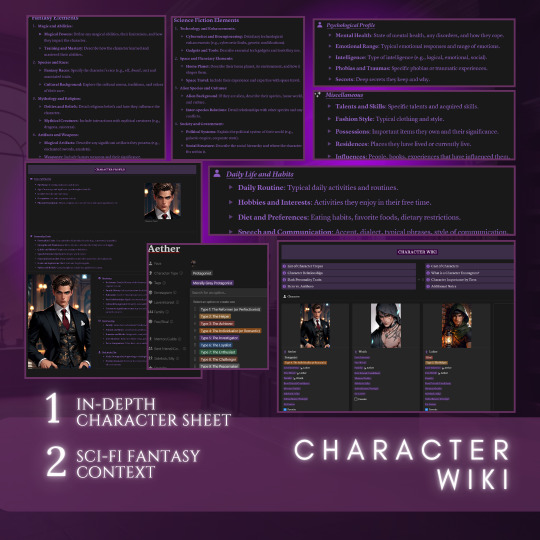
#writer#writing#writer things#writerblr#writerscorner#writing inspiration#writing tips#author#writers and poets#ao3 writer#writeblr#fantasy writer#sci fi and fantasy#writing inspo#writing resources#dnd campaign#dnd character#character development#original character#amwriting#writers community#writer stuff#writing blog#writers block#writerscommunity#worldbuilding#world building#fantasy series
3K notes
·
View notes
Text
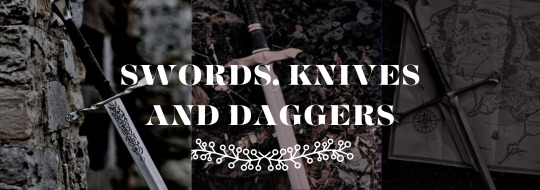
Writing Weapons (2): Knives and Daggers
Dagger vs. Sword
In many situations, daggers might be more plausible than a sword fight.
Dagger are eaiser to carry and conceal, lighter, faster, good for spontaneous action, suicide bids, self-defense and assassination.
Dagger vs. Knife
No clear distinction; terms used interchangeably
Dagger is more for thrusting with 2 sharp edges
Knife is more for cutting (slashing) with 1 sharp edge
Concealment
Carried in a leather sheath on the belt
Can be concealed under a cloak, in a bodice (sheath sewn into the bodice), in a boot, behind hari ornaments
Bodice daggers (popular in the Renaissance) had no cross guards.
Connotations
Beside its combat value, the dagger has lots of emotional and sexual symbolisms.
The closeness need to attack with a dagger creates intense personal connection. They are often used in fights where emotions are running high: gang warfare, hate crime, vengeance.
Due to its shape and the fact that it's usually worn on a belt made it a symbol of virility in many cultures and periods.
Sometimes it was the hilt rather than the blade: like in the case of bollocks daggers with two...balls on either side of the hilt.
Fighting Techniques
Stabbing:-
The dagger with long, thin blades are made to stab a vital organ like the kidneys, liver, bowel, stomach or heart.
Stabbing directly at the chest seldom works, since the blde may glance off the ribs. Position the dagger below the ribcage and drive it upwards, through the diaphragm and into the lungs. If the sword is long enough and your fighter is a professional, you can get to the heart.
If no professional, just keep going for the stomach and you'll get one of the vital organs eventually.
Slashing:-
When describing a slash wound, show a lot of blood streaming, or even spurting.
Slashing dagger fights are bloody - show your MC's hands getting slick with blood, grip on the weapon slipping.
The aim is to cut the opponent's throat or cut tendoms, muscles, or ligaments to disable. Slashing the muscles in the weapon-wielding arm is the most effective; insides of the writst or back of the knee is also critical.
Assassinations:-
Show good knowledge of the humna antatomy
Use a stabbing dagger
A single, determined, calculated and efficient stroke, probably below the ribs.
Self-Defense:-
Disable the attacker by slashing their weapon-wielding hand (elbow or wrist)
Quick, multiple stabs wherever the MC can get the blade to land; the attacker won't give time for careful positioning
If the blade is too short to do any significant damage, maek up for this by stabbing so ast that the pain and blood loss distracts the opponent.
Vegeance and Hatred:-
Someone who is motivated by raging emotions will stab the victim repeatedly, even after he is already dead.
The attacker may stab or salsh the victim's face, disfiguring it.
Contemporary street fights and gang warfare usually involves these.
Duels:-
If both fighters are armed with daggers, include wrestling-type moves as they try to restrict each other's weapon hand.
Show them trying to disable each other by slashing insides of writes, elbows, the back of the knees, etc.
Dagger + Sword
If the character is expecting a fight, they can hold a sword in their right hand, and a dagger in their left to fight with both
Sword + mace combination also common.
Blunders to Avoid:
Direct stabbing at the chest wouldn't work.
Hero cannot cut his bread with a stabbing sword
adapted from <Writer's Craft> by Rayne Hall
#writing#writers and poets#writers on tumblr#helping writers#creative writing#writeblr#let's write#poets and writers#creative writers#resources for writers#dagger#fight scene#description#action scene#writer#write#fantasy#medieval fantasy#high fantasy#fantasy world#writer on tumblr#ao3 writer#writer problems#writer stuff#writer community#writer things#author#writing practice#writing prompt#writing inspiration
1K notes
·
View notes
Text
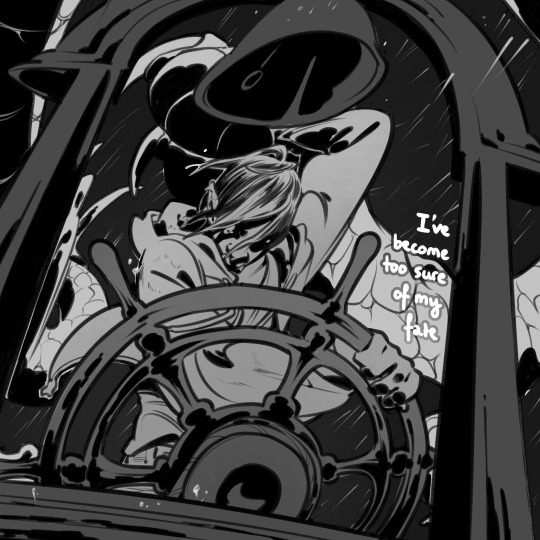
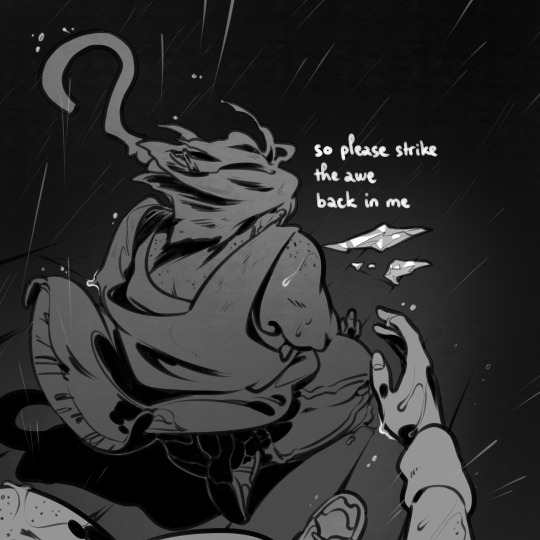
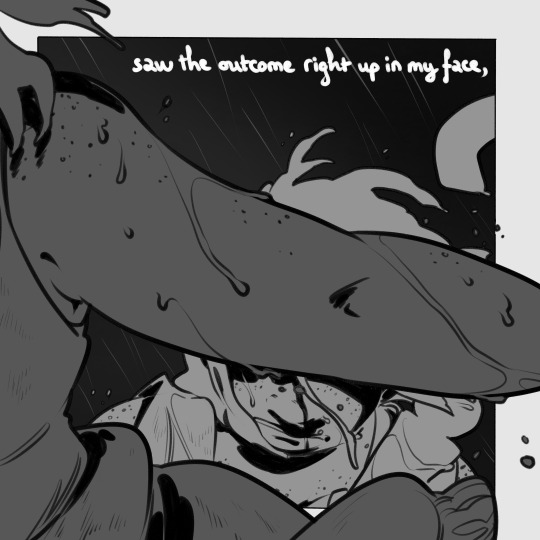
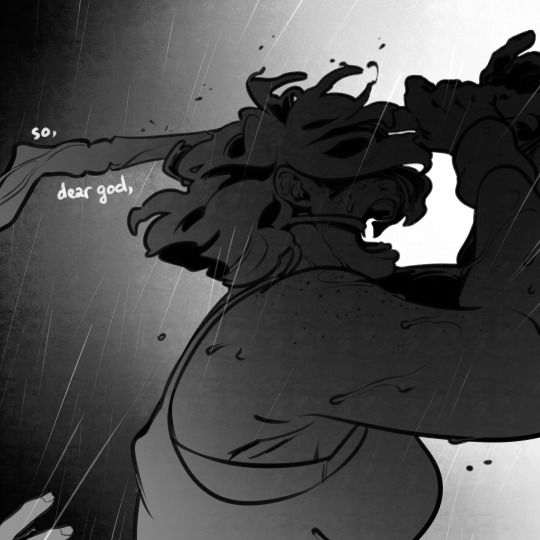
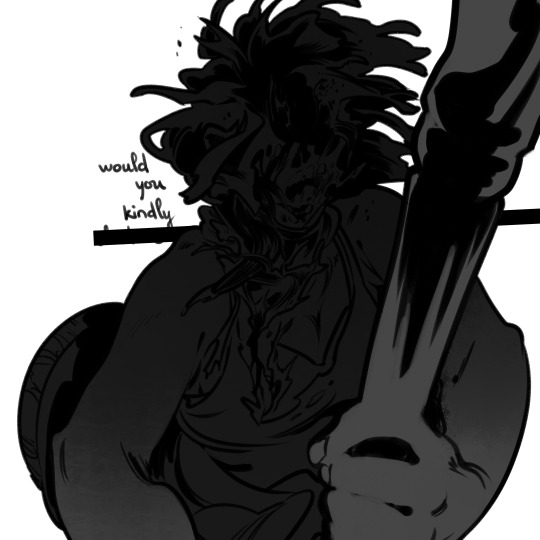
prayer of the day:
#dimension 20#fantasy high junior year#fhjy spoilers#fhjy k2#gorgug thistlespring#kristen applebees#cw: gore#and we're serious abt that warning this time! we mean that shit!#slowly getting some stuff I wanted to draw for the boat fight-finale combo that I couldnt draw in time bc I was doing huge comic#k2 is the Funniest thing to ever happen not bc she's a good bit (she is but thats not relevant here) but bc she let me have Clone Politics#insane shit. so wild that brennan has to send her to real life forever to keep himself safe from her (he isnt)#tbh I love cassandra's domain esp. for stories she truly is the deity for jackasses. k2 walking in here like#idk whats going on but I know it's not good! and by the power of this fucking guy I will unlearn that knowledge#beautiful. wish that were me#doubt as irrational stubborn hope... honestly inspired#wherever u are out there k2. hope ur doing well. going to college learning so much abt the world
825 notes
·
View notes
Text

Nobody wants to guard the civilian sea-gate.
It’s not that it’s a difficult job- hell, it’s barely a job at all. Nobody wants to swim in the water, it’s bad luck- so nobody ever comes to the gate. It’s a grueling 48 hours spent standing watch, watching nothing, bored out of your skull.
But still, two knights must stand at the ready just in case some poor idiot shows up- lost and confused, and always panicky to find themselves so close to the shore.
You make friends fast though, you and the other knight you’re stationed with. Often folks will bring cards, dice, or some other manner of distraction- or you’ll get talking, gossiping, it’s almost fun.
And yet, nobody wants to guard the civilian sea-gate. Nobody ever wants to be that close to the water.
#wanted to try my hand at some short fiction stuff#love coming up with little stories to go along with illustrations#world building#art#illustration#drawing#digital art#fantasy art
407 notes
·
View notes
Photo

⁜ Il cielo guarda solo chi merita ⁜
--
Kofi | Patreon
#oc#casity#broken dahls#knight#doodles#possessed by immense drawing energy in the middle of the night#Definitely the realm of the kinda art-vibes I wanna do more of--#edgey pseudo-catholic aesthetic tarot card sorta stuff o vo#mixed some of Casity's OG goth/angel vibes into the newer fantasy direction she and her world have taken these days#a good drawing night for me -- would love a repeat#lyric is from mahmood's ghettolimpo#for no reason other than i like how it sounds#cuz in reality i was listening to MCR and ibaraki while actually drawing c:
3K notes
·
View notes
Text
A thought on Elves and Dwarves (as inspired by my roommate and I and the one place where our brains really don't line up):
Elves with perfect memories, who know exactly where they put that thingamajig even when they last set it down twenty years ago, and thus can always find whatever it is they're looking for amidst what looks like total disarray to everybody else.
Dwarves with perfectly ordered spatial awareness, who are so accustomed to the layout of their workshop or forge that they can lay their hands on any tool in there without even looking, and always set everything back where it belongs out of ingrained habit.
Elves who never ever put things back where they belong, because "put that away neatly so you can find it again" is simply not a concept that exists in elvish minds, because it doesn't need to.
Dwarves who will look right past the thing they're looking for if it's not where it belongs, because it's not where it belongs, why isn't it where it belongs, where did you put it you daft elf...?
Elves and Dwarves in the smithies of Ost-in-Edhil, ready to go to war over the arrangement of their tools, and Celebrimbor on the brink of tears desperately trying to keep the peace here that he never managed to in Nargothrond.
(alt: could easily be done the other way around too, with elves always putting things away because then the thing is always where it's supposed to be, even twenty years later, so you can find it again, because they have so many more important things to hold in their memories than where they last put down their favorite hammer, and after a few hundred years you fall into the habit of expecting things to be where they belong so you don't even look to find them somewhere else; and dwarves who have such an innate sense of their tools and their workspace that they don't need to have "proper places" to put things away, because of course they remember where they put their hammer, what kind of a question is that, can't you just feel where your hammer is wtf???)
#elves#dwarves#lotr headcanons#fantasy world building#world building#celebrimbor#gwaith i mirdain#lotr#my stuff#my writing
511 notes
·
View notes
Text


Two young knights
#TeuTemp sketch :)#shoutout to the like two teutemp fans out there they are so cute#Love the few interactions they have in the manga wish there was more 😔#be the character interaction you want to see in the world#I wanna do more fanart of these two I love em#me: I hate armor so much#also me: continues to draw exclusively fantasy medieval characters#everyone look at my two little knight bois#I like to imagine sometimes they get to act like kids during trade markets and stuff and run around looking at things and eating sweets#fated to end in tragedy :)#the dialogue in my head was like#Gilbert: the hell are you lookin at?!#Gabriel: be nice Gil ^^#I’ve seen so many names for Knights Templar#I like Gabriel and Hadrian and also maybe Salomon the most#historical hetalia#hetalia fanart#hetalia#teutemp#aph teutonic knights#aph knights templar#hws prussia#aph prussia#hws knights templar#gilbert beilschmidt#digital art#my art#commissions open#artists on tumblr#fanart
463 notes
·
View notes
Text

Your unshakable Warrior here to shield you :)
♫ ♪ ♫ ♪♫ ♪ ♫ ♪
Are you looking for a Bard?
Are you looking for a Warlock?
Are you looking for a Ranger?
#WistfulArtSims4#WistfulWorldSims4#WistfulR&D#sims 4#d&d#human warrior#fighter#fantasy#d&d warrior#my ocs <3#my oc stuff#the sims 4#sims 4 fantasy#sims 4 fantasy world#my sims 4 character#my sims#human#warrior class#fighter class#rpg#my characters#d&d fighter#I changed the eyes
288 notes
·
View notes
Text

[OLD ART ALERT] A COLLECTION OF SCENES FROM THE GILLIONS CATSCRATCH ARC THAT BROUGHT ME GREAT JOY. i love fishy chips especially when its just gillion being delirious and violent and hostile
#jrwi fanart#jrwi show#jrwi riptide#jrwi riptide spoilers#JUST NOTICED A MILLION MISTAKES FUUUUUUUUCK BUT WWHATEVERRRRR IF I STARE AT THIS ANYMORE IM GONNA HHUURRRLLL#SO I REALLY LIKE FISH AND CHIPS RIGHT. IVE BEEN IN LOVE W THE SHIP EVER SINCE THAT NAT 20 KISS#BUT I THINK I SHIP IT WRONG. OR LIKE. I AM CORRECT BUT EVERYONE SHIPS THEM DIFFERENTLY#THE FISH N CHIPS I SEE EVERYWHERE ELSE IS SO FLOWERY AND SWEET AND ROMANTIC. AND THATS NICE! THAT STUFFS NEAT#but gillion and chip would NEVERRRR enter anything similar to a romantic relationship. chips too damaged and gillions too uninterested#I LIKE MY FISH N CHIPS ONE SIDED AS FUCK#bc 2 gillion chip is his best friend in the whole wide world but hes also kinduvagross little man that took him a MINUTE to really warm up2#but to CHIP gillion is this powerful and gorgeous and heroic paragon of destiny and his best friend in the whole world who will#bring about the eschaton. 'i didnt believe in destiny until i met you' until i met a champion radiating with a light thatll alter the world#OHH REMEMBER THE FIRST ICE ARENA?he was so mad.still probably shaking from the ordeal.NEVER had he felt true divine radiance CLEAVE through#his SOUL like that.do you remember that moment in the forest w the bugs. an alien from the ocean; lacerating the land w lightning#when the realization flickered in chip for a moment.that the thing standing before him was more powerful than he could ever fathom#remember when grizz mentioned that the nat20 kiss was the 'best kiss chip ever experienced'. that has nothing to do w this. where was i.#LOST MY TRAIN OF THOUGHT. BUT HEY. I THINK at the beginning chip absolutely knew that gill was smth grand n powerful n scary#when gillion revealed what exactly the prophecy was;chip got defensive and mad.sure he was sleep deprived but OOH. HES SCARED!#he believes gillion too! he believes that his destiny is to eradicate either the sea or land and that scares him!#but then he gets past it bc ultimately he trusts his bestfriend gillion so so much. he fuckin loves this dude.#he would throw himself intothe path of fire for this dude. he would boat across the ocean for this dude.he would build arenas for this dude#even if this dude will end half the world.even if this dude wields the power and the obligation to eradicate him at any second.#even if this dude is going to throw himself into harms way for his own comrades.even if this dude is just going to sacrifice himself.#one way or another one shall die for the other.these self-sacrificial bastards click so well with eachother!!#chip believes his body is best used to pave roads and gill believes his body is destined to pave prosperity.WHATEVER!!#i really love their dynamic!! they care for eachother so much!in MY heart tho. the icing on the cake here is the fantasy that chip is#just a bit more In Love w gillion than he realizes. like this powerful fish guy is HOT and PRETTY and KIND and FUNNY and LOYAL and STRONG#but gillion would never rly feel that same sort of attraction towards chip. its just not rly his thing. aroace as fuck man.#thats how it is in MY little heart atleast. and i sit here and play w my touys in my brain n i explore my silly lil one sided fish y chips.
212 notes
·
View notes
Text
Worldbuilding Countries (Part 1)
I've lived in and visited a few countries in my life, which gave me a lot of inspiration for my fantasy novel. I'm not an expert, but I thought I'd share what I learned!
Climate
The climate will most likely come up at some point. Do you mention the cool breeze, or the orange leaves on the trees? All those nice weather descriptions will depend on the climate!
If you have a couple of different countries, it may be a little weird if they all have the same climate (especially if they are far away from each other), so there's a few things you can consider to make them a bit more specific.
Climate is of course a very complicated topic, so I will simplify it a bit.
Temperature
I like to pick a real country/city and look at its temperature graphs on Wikipedia. One important thing to note is that countries aren't simply colder/warmer than one another. I know a lot of people think that a country like Russia is cold all year round, but it is actually quite warm in summer. Some areas have a larger variation between temperature throughout the year than others (normally, the closer to the equator a country is, the less variation there is. They also tend to be warmer).
Look at Singapore:

The temperatures are basically stable all year round (the letters up top are the months). The numbers are the average minimum and maximum daily temperatures. You can see that on average the variation every day is less than 10°C.
Here is Moscow:
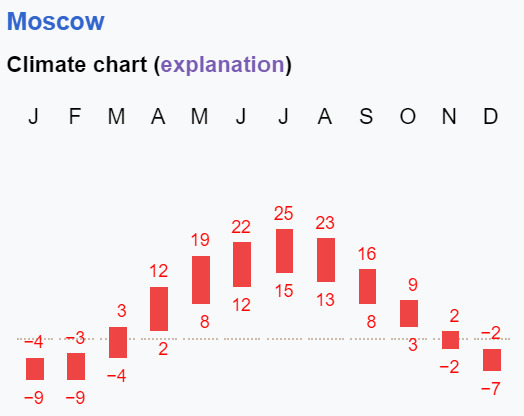
The temperature changes quite a lot throughout the year. Note that the maximum temperatures (summer) will occur at the opposite times of the year in the Southern Hemisphere.
You can see this demonstrated in Copiapo (Chile):

This city is in the Southern hemisphere, so their coldest months are June and July :)
One thing you may have noticed is that the bars here are taller, which means that the variation for the daily min and max are higher too. Why is that? I'm simplifying it a bit, but generally, the dryer a place is, the more variation you will get in daily temperature. Which brings us to the next thing to consider:
Humidity/Precipitation
There are a few things to consider:
Rainfall. This can vary month-by-month, and due to some complicated factors, some countries have more rain in their colder months, some have more rain in their warmer months. Some places don't follow a neat pattern or stay consistent throughout the year. Have a look at climate pages on Wikipedia to get some ideas! Even just this page on Chile has a lot of cool examples. Each city is quite different!
Although of course the "wetness" of a country related to rainfall (e.g. you'd expect greener grass somewhere with more rainfall, brownish dry grass or a desert somewhere with less rainfall), it's not that simple. UK is a wet country, right? And if you've heard of Gold Coast (Australia) it seems pretty dry, right? Well, actually the Gold Coast gets twice as much precipitation (rain) as London!
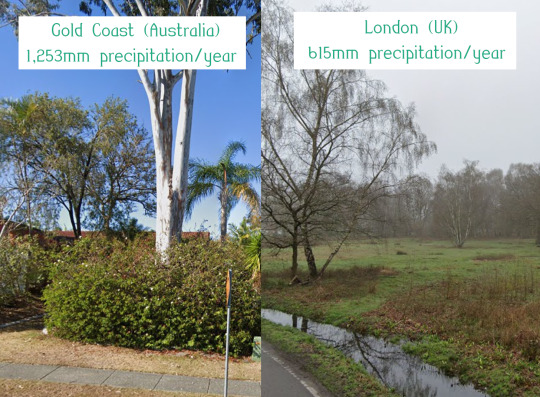
To demonstrate, I took a screenshot (randomly selected street in each city) from Google Streetview.
Why this difference? I suspect it's because the Gold Coast is much hotter. Living in Australia, puddles are normally gone by the next day (often the rain even evaporates as it hits the ground!), but in UK, the puddles would always stay around for a while.
The UK is always mossy, often the clouds hang in the sky for ages. It can look quite grey. When it rains in the Gold Coast in summer, the raindrops evaporate as soon as they hit the pavement, which makes the air feel very humid and smell strongly of rain. You can use these sorts of sensory details in your stories :)
Also, one thing I noticed, is that in hotter weather, rain can be much more heavy than in colder weather. In Australia we often get heavy rain that causes flooding. In UK the rain usually dribbles all day but doesn't get heavy. In a place like the Gold Coast you can get rain that last 10 minutes but soaks you all the way through and floods the street.
The rainfall may also vary year-by-year. Australia goes through periods of floods and droughts that last a couple of years. The mechanism is a bit complicated so I won't go through it now, but it gives you something to google!
Humidity: Deserts have low humidity, which means that you can cool off more easily in the shade and the nights are colder. The breeze feels more refreshing at low humidity as your sweat evaporates.
High humidity (like Singapore) will feel much hotter at the same temperatures and it is normally still quite hot in the shade. High humidity feels really muggy, the air feels thick. The sweat doesn't evaporate as much, so you are left all wet and sticky. The breeze can feel much less refreshing because of this.
When the temperature is below freezing, the humidity gets very low, so your skin may need more moisturiser or your lips may crack.
Those are just some things to consider while describing your weather!
Generally, closer to the sea will be wetter, further inland is dryer. Have a look at some climate maps on Wikipedia, you will learn a lot! Climate is quite complicated since there are so many factors, so there's a lot you can do with it.
UV: This is one thing that people often forget about when they think about weather. In the UK, even on a very hot and sunny day, you are unlikely to get sunburnt (unless you are very pale). In Australia, you can get sunburnt very easily in even Tasmania, which is our coldest state, even when the temperatures are chilly.
You can't actually feel being sunburnt, which I fully understood when I visited Tasmania. I was freezing, but the whole time I was being sunburnt.
Normally, UV index is higher closer to the equator, which is why people who live closer to the equator tend to have darker skin. The melanin acts as protection against the sun. Still, this protection isn't perfect, so in the real world people in Africa used different methods to protect their skin, such as using clay as a "sunscreen".
Australia has the highest rate of skin cancer in the world. This is partially because most people in Australia have pale skin (originally from the UK), but the UV index is high.
This is something to consider in your story, since it can play a bigger role in behaviour than you'd expect if you live in a cold climate. In Australia, they recommend staying indoors between certain hours of the day to avoid sunburn, and if you do go out you should wear clothes that cover your skin, a wide-brimmed hat and sunscreen. Someone with very pale skin can get sunburnt in minutes. Wide-brimmed hats are compulsory at schools in Australia - you are not allowed to play if you forget your hat.
In low-UV areas, there is the opposite issue. People with darker skin can have problems getting vitamin D. Same goes for people who cover their skin with clothing (e.g. for religious reasons). However, this is a bit simpler to fix with some vitamin D supplements.
How do I use this for worldbuilding?
If you have a map of your countries, you may want to keep their location in mind when deciding on the climate :)
I like to draw up some graphs with the temperatures throughout the year for each country and some quick notes on the humidity, rainfall and UV.
You can also add some other elements to your story. Is it a fantasy? Maybe magic affects the weather! Sci-fi? You can play with the distance of the planet from the sun, axial tilt, sun size etc. (I won't go into that since it's a whole another topic and really complicated as well)
You probably don't need to know the exact details of the climate for most stories, but having a general idea will allow you to consistently describe what sorts of clothing your characters wear, the weather etc. Those are the sorts of things that comes up in almost every story (if it's long enough).
If you read this and found this useful, please reblog so I know that it was helpful. If it seems like people enjoyed this post, I will make more (I was going to talk about so much more, but this is already too long).
#writeblr#writeblr community#creative writing#world building#writing tips#writing resources#writing advice#how to write#fantasy#science fiction#climate#writing#novel writing#comic writing#worldbuilding#fantasy worldbuilding#fantasy world#writing community#writer stuff
306 notes
·
View notes
Note
Hello! 😊 Do you have any advice on word-building? I can imagine multiple scenarios in my head, but I can't seem to put them into words. 🥹
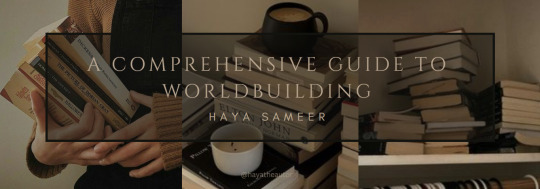
First off hi sorry I took forever to write this blog! I hope it helps you get your ideas onto paper <3
Worldbuilding is the backbone of any compelling story, especially in genres like fantasy, science fiction, and historical fiction. Crafting a believable, immersive world can captivate your readers and provide a solid foundation for your narrative. In this guide, I’ll walk you through the essential steps to create a vivid and engaging world for your story.
Understanding Worldbuilding
Worldbuilding involves creating a complete, fictional universe that serves as the setting for your story. This process includes developing geography, cultures, history, politics, and even the rules of nature and magic (if applicable). The goal is to make your world feel as real and intricate as the characters who inhabit it.
Starting with the Basics
Define the Genre and Tone
Consider the genre of your story. A high-fantasy world will have different requirements than a dystopian future or a historical setting. The tone—whether it's dark and gritty or light and whimsical—will also influence your worldbuilding decisions.
Establish the Setting
Start with the physical world. Sketch out maps, outline the geography, and decide on key locations where your story will unfold. Think about the climate, natural resources, and the flora and fauna that inhabit this world.
Develop a History
Create a backstory for your world. Major events, wars, discoveries, and cultural shifts shape the present-day setting. A rich history can add depth and realism, influencing characters’ beliefs and motivations.
Building Cultures and Societies
Craft Unique Cultures
Think about the various cultures in your world. What are their customs, traditions, and social norms? How do they dress, what languages do they speak, and what religions do they follow? Diverse and well-thought-out cultures can add layers to your narrative.
Political Systems and Power Structures
Define the political landscape. Who holds power, and how is it distributed? Are there monarchies, democracies, or tribal councils? Consider the relationships between different nations or groups and the potential for conflict.
Economics and Resources
Understand the economy of your world. What resources are abundant or scarce? How do people trade, and what currencies do they use? The distribution of resources can drive plot points and character motivations.
Crafting Magic and Technology
Magic Systems
If your world includes magic, establish clear rules and limitations. What are the sources of magic? Who can use it, and how? Consistent magic systems prevent plot holes and maintain suspension of disbelief.
Technology Levels
Consider the technological advancements in your world. Are they using medieval weapons, steampunk machinery, or advanced futuristic gadgets? The level of technology can influence daily life, warfare, and exploration.
Time and Place
Historical Context
Establish the timeline of your world. Is it set in the past, present, or future? Consider historical events that have shaped the current state of the world. How have these events influenced societal development and cultural evolution?
Daily Life and Schedules
Describe the daily routines of your characters. What does a typical day look like for different social classes or cultures? Consider work hours, leisure activities, and societal expectations. The pace of life can vary greatly depending on technological advancements and cultural norms.
Timekeeping and Calendars
Develop a system of timekeeping and calendars. Are there specific seasons, festivals, or holidays that are significant? How do people measure time—by the sun, moon, or a mechanical clock? Unique timekeeping methods can add depth and authenticity to your world.
Clothing and Fashion
Cultural Significance
Explore how clothing reflects cultural identity, status, and occupation. Different regions and social groups might have distinct styles, fabrics, and accessories. What materials are commonly used, and how are garments crafted?
Fashion Trends
Consider the evolution of fashion in your world. What are the current trends, and how do they vary across different societies? Fashion can be influenced by historical events, climate, and interactions with other cultures.
Practicality and Symbolism
Think about the practicality of clothing in your world’s environment. How does the climate affect what people wear? Additionally, consider any symbolic meanings attached to certain garments or accessories. For instance, specific colors or patterns might denote rank or allegiance.
Religion and Beliefs
Pantheon and Deities
Create a pantheon of gods or a single deity, depending on your world’s religious structure. What are their characteristics, domains, and myths? How do they interact with mortals, if at all?
Rituals and Practices
Detail the religious rituals and daily practices of your world’s inhabitants. Consider ceremonies, festivals, and rites of passage. How do these practices influence daily life and societal norms?
Religious Institutions
Define the structure and influence of religious institutions. Are there temples, churches, or shrines? What roles do priests, shamans, or other religious figures play in society? The power dynamics between religious and secular authorities can add layers to your worldbuilding.
Languages and Communication
Linguistic Diversity
Develop the languages spoken in your world. Are there multiple languages or dialects? Consider the history of these languages and how they evolved. Language can be a powerful tool to convey cultural diversity and conflict.
Writing Systems
Design writing systems and scripts used for communication. Are there ancient texts or runes with special significance? How do literacy rates vary among different social classes and regions?
Non-Verbal Communication
Explore other forms of communication, such as body language, sign language, or symbolic gestures. How do people convey messages in situations where spoken language is impractical? These non-verbal methods can add depth and realism to your interactions.
Integrating Worldbuilding into Your Story
Show, Don’t Tell
Instead of dumping information on your readers, reveal your world organically through the narrative. Use dialogue, actions, and descriptions to weave worldbuilding details seamlessly into the story.
Character Perspectives
Different characters will experience and interpret your world in unique ways. Use their perspectives to highlight various aspects of your world, making it richer and more complex.
Consistency and Continuity
Maintain consistency in your world’s rules and details. Keep track of your worldbuilding elements to avoid contradictions and ensure a cohesive narrative.
Worldbuilding Tools and Resources
Maps and Diagrams
Create visual aids like maps, family trees, and diagrams to help you keep track of your world’s layout and relationships. Tools like Inkarnate or Wonderdraft can be helpful for map-making.
Worldbuilding Bibles
Maintain a worldbuilding bible—a document where you compile all your world’s details. This can include notes on geography, history, cultures, and more. It’s a valuable reference as you write and develop your story.
Inspiration from Real World and Fiction
Draw inspiration from real-world cultures, histories, and landscapes. Similarly, reading widely in your genre can provide insights into effective worldbuilding techniques.
Final Thoughts
Worldbuilding is a rewarding yet challenging aspect of storytelling. It requires imagination, attention to detail, and a deep understanding of your narrative’s needs. By following this comprehensive guide, you can create a vibrant, believable world that will captivate your readers and enhance your storytelling.
Looking For More Writing Tips And Tricks?
Are you an author looking for writing tips and tricks to better your manuscript? Or do you want to learn about how to get a literary agent, get published and properly market your book? Consider checking out the rest of Haya’s book blog where I post writing and publishing tips for authors every Monday and Thursday! And don’t forget to head over to my TikTok and Instagram profiles @hayatheauthor to learn more about my WIP and writing journey!
#hayatheauthor#haya's book blog#haya blogs#writing community#writing tools#writer things#writing advice#writer community#writing techniques#writing prompt#writing stuff#creative writing#ya writing advice#writing tips and tricks#writer tools#writers of tumblr#writer blog#writers block#writers on tumblr#writerscommunity#writer stuff#author help#author advice#writing#author#quillology with haya#worldbuilding#world building ideas#fantasy worldbuilding
195 notes
·
View notes
Text
Worldbuilding Checklist (STILL UPDATING)
This is basically a bunch of worldbuilding checklists crammed together. Use what works for you, leave the rest. This is fantasy orientated and I will continue to update it regularly so reblog or comment something you think should be added.
History:
How far back does recorded history go?
How does history interact with myth and folklore?
How did the current system of governance come into power?
What are some notable figures of history?
Is your world's history broken down into eras?
What events have been twisted and changed as they've been passed down through the generations?
Geography:
What is the climate of this area?
What are the common plants of this area? Are there any fictional plants?
What are the common animals of this area? Are there any fictional animals?
Are there continents? Islands?
How much of this area is inhabited?
What area is known?
Country borders?
What are the major geographical landmarks i.e. rivers, mountains?
Where are the major trade routs?
What are the seasons like in this area?
Magic System:
How is magic practiced? Using wands, staffs, runes, etc?
How is magic learned?
Can magic be taken?
What can't magic do? What are its limitations?
What is the first thing a person learns when learning magic?
How are magic users perceived by others?
What are the laws regarding magic?
How does magic link to religion?
How has magic influenced history?
Politics and Law:
What style of leadership rules the area i.e. theocrasy (ruled by religion), monarchy (ruled by a royal family)?
How are laws created?
What is the process from the conception of a law to the point where it passed?
How is the law enforced?
What is the judicial system of this place?
Is there a death penalty?
Society and Culture:
How many major cultures are there?
What is their global population?
Where are they located geographically within your world?
Is there a social hierarchy / a division between the classes?
What are the major pieces of art in this world?
What does its music sound like? What instruments are used?
Are there well know folk songs?
What food is eaten by each group of society?
What are the treat foods of this area?
What are the foods saved for special occasions?
What holidays / special occasions are there?
Religion:
What are the major religions in this area? Do they get on with each other?
How are these religions viewed by their worshippers? By those who worship other religions? By those who worship no one at all?
How much does religion influence politics and the laws passed?
What do these religions believe in?
Are there divisions within these religions between groups who believe slightly different things?
How old are these religion? Which came first?
Which religion has the biggest influence on the world?
What are their opinions towards the government?
What are their opinions regarding the poor and the rich? Do they differ?
What are their opinions towards magic and technology?
Commerce and Industry:
What is the major industry?
Main imports / exports?
How wealthy is this country / area?
What valuable resources does this country / area have?
What are the common crops / livestock in this area?
Is this area coastal? Is there a fishing / trade industry?
Is this area forested? Logging and timber?
Technology:
What are the transport option available? For the poor? For the rich?
#writing#writing prompts#writeblr community#creative writing#writing prompt#prompt#fantasy prompts#prompts#writeblr#fantasy worldbuilding#fantasy#writing fantasy#worldbuilding#world building#worldbuilding stuff#worldbuilding questions
510 notes
·
View notes
Text
one thing I really really appreciate abt riz gukgak as a character is that he is un-self-aware to the max. he inhabits his body so completely. the arc that would usually be run as "I'm different and unable to connect with my friends in this way that everyone seems to be able to do and so something's wrong with me and I don't like myself" when it comes to riz is actually like no! I have literally no problems or praises for myself personally. I don't stand outside of my own self and judge it. it's phrased as "other people will eventually find someone more important to them than you" rather than centering it on his self-perception. he doesn't know why he doesn't have the best social life on earth even though he's not afraid at all to talk to other people. every time he sees himself in someone else's actions or behaviour he gets startled by it. his latest epilogue is realizing seemingly for the first time that he's not just an agent of causes but an actual character. he's my hero and I want to be him when I grow up
#not art#fantasy high#this trait with him is kinda why I don't really ascribe any prominent trans narrative to him. even though hes very gender#I think I said once like bc he didn't just walk into the girls bathroom I don't think he finds himself on that axis in general#bc if he's any less attached to his gender he would 100% have done it lmao#and the great thing is the more he gets comfortable with his friends the less self aware he becomes#saying shit like ''chop his head off so he doesn't revive'' fully uncaring for the optics. I love him#its honestly great esp. with the Living While Goblin stuff going on too. no inner conflict with that dude#he's fully great! he's awesome he's all gucci. the world is just fucked and that's why shit sucks for him#(this makes me doing something model-minority-adjacent for bard!riz a bit harrowing shdjsh I dont wanna lose this)#(he's dictated by fear but it doesn't mean he reflects those fears back onto himself as a person lol. at least kid got better)
282 notes
·
View notes
